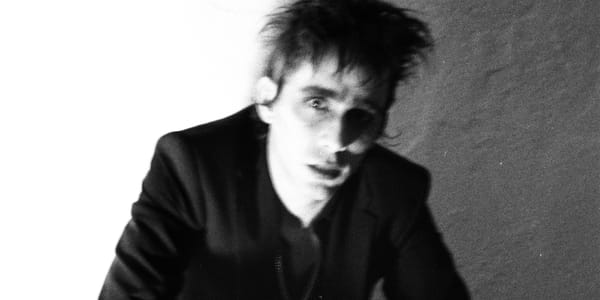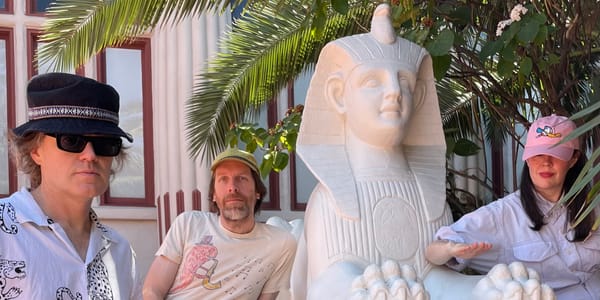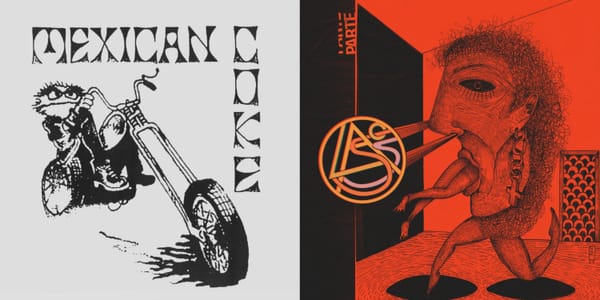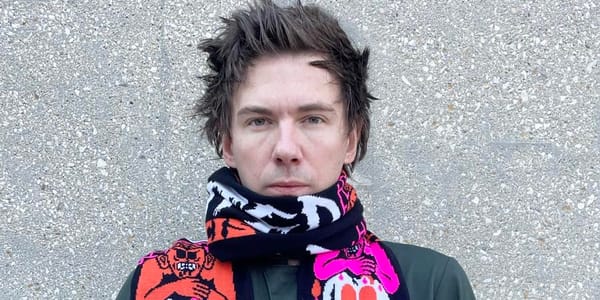fucked up’s jonah falco is helping shape the sound of uk punk
As the producer of recent albums by the Chisel, High Vis, and Chubby and the Gang, Falco’s ear and anthemic reach have propelled a batch of UK punk records. He lives on a boat.
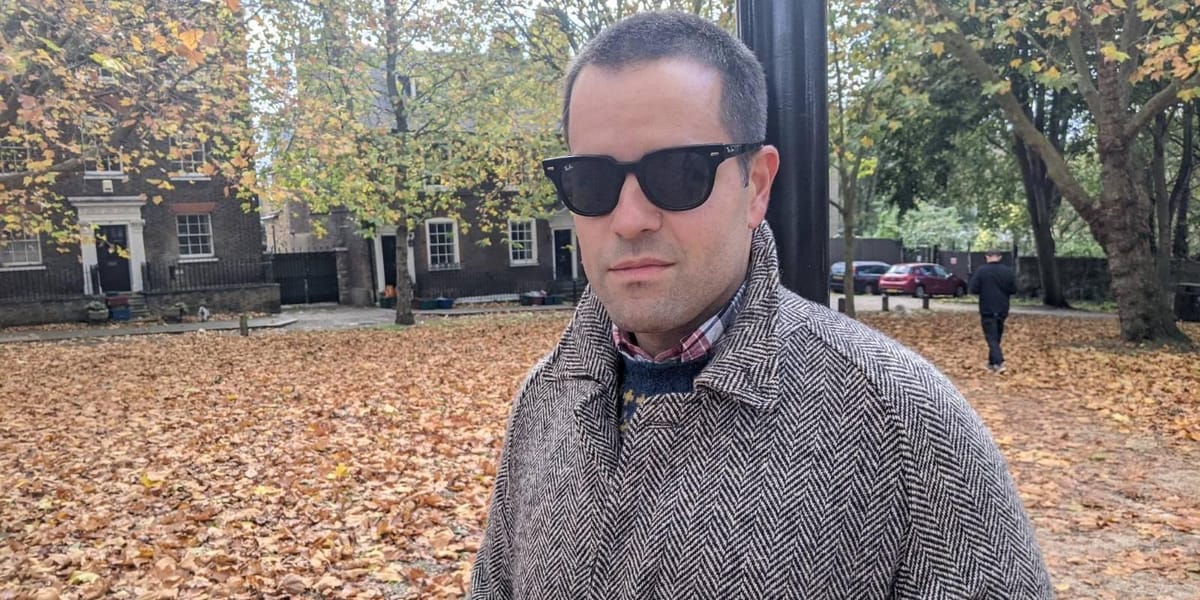
At some point around the outset of the pandemic, Jonah Falco of Toronto hardcore/indie rock giants Fucked Up had his name appear as the engineer and producer on the credits for several UK punk records. There he was, behind the boards for the outstanding debut Chubby and the Gang album Speed Kills and its follow-up The Mutt’s Nuts. He worked on the last High Vis album Blending, and most recently, he collaborated with the Chisel on their excellent new album What a Fucking Nightmare. On raucous oi! records and albums defined by post-punk wash, Falco’s signature seemed to appear on each record—an anthemic polish, little power pop touches that glitter up the grit. Just listen to the Chisel’s “Cuts Like a Knife,” which gleams with pop ambition over a biting vocal performance.
It turns out, Falco married an English woman and they live together on a boat in London. He moved there for love in 2016, which slotted into his life as a working and touring Canadian musician easier than you might assume. “I’m very lucky that my life is essentially modular anyway,” he says. “You’re on and off the road, and Fucked Up was kind of in a flow; it's not like we practice weekly. We just get together before a tour and do some stuff in the studio here and there.”
Outside his work as a producer and his most popular band, Falco is the singer in the band Boss, a project he describes as “strangely tenuous” that’s put out two excellent singles. “Steel Box,” which got a release by Goner in 2018, is about living on the boat. As far as what’s coming in the future, he’s got a new album coming with Jade Hairpins, there’s a third Chubby and the Gang album on the way, and he worked on a forthcoming new one from Edmonton’s Home Front. When we spoke, he was a few days into producing the third High Vis album. Falco took a moment out of a busy recording schedule to discuss his role as producer, helping shape the sound of a scene, and boat life. (He was in an office, not on the boat, during this chat.)
The first record out of the UK I noticed your credit on was Chubby & the Gang’s first album Speed Kills.
That record just blew up seemingly out of nowhere. That was sort of a landmark thing for me all my other records that have been kind of popular have just been strictly within subculture and that sort of all of a sudden popped its head out. I've done every record Charlie—Chubby in the Gang—has done.
I remember him telling me he had this idea for a project and I recorded their first single “Uxbridge Road” in a basement not too far from where I'm sitting right now. We just did the music. Charlie didn’t have the time and he didn’t quite have it put together to do the vocals. A few weeks later I was like, “OK, well have you got the lyrics, you got the microphone, you got a sound check, I’m gonna hit record and you just sing.” So I hit record and he went to sing the first note and just made a noise. He said stop and was like, “I’m making a terrible mistake, I don’t think we should do this, let’s just leave,” and I was like “no no no no come on, try it, it’s all right.” And here we are. That record opened doors for both of us in many ways.
Do you feel like you know what you contribute as a producer for these bands?
I ask myself this question all the time. Like any person in the arts or in the creative industry, I struggle with imposter syndrome. You wonder “what am I really doing here,” especially in the producer's seat. You basically have a group of people who have an idea. I'm not writing those songs, but in some cases I'm helping with parts or overall crafting. In some cases I’m writing bits, but it's their thing. I have my hands in there, making sure that it comes out the best way possible, but my role is really kind of like a musical HR department. My strength is music and my strength is working with people.
This is not a comment on the Chisel or High Vis or Charlie or anything—they rule at what they do—but I love working with people who are a bit more rough around the edges in terms of how they can play. That's where I can help the most. The creative pursuit is daunting because until you're in it and you're used to how ideas change, it just feels like there's only wrong answers when what you do isn't coming out. It’s like the first time you tried to play that instrument you thought, “Why doesn't this sound like when my favorite person does it right?” I see my role as a person through which you can get a little bit closer to how you want the thing you're making to sound.
When I think about you as a producer, I think of something like the handclaps on “All Along the Uxbridge Road”—this pop-forward adrenaline burst.
That was me, yeah. [laughs]
You’re talking about producing music that’s rough around the edges in its approach. What I hear on the records is this anthemic glow-up that expands the sound beyond what you might hear when the band plays a show. Do you feel like that’s an accurate portrayal of what you bring to the table?
I do feel like that is what I can contribute. I think there's a two-way street of being in the producer's chair…really it’s a four-way junction. Part of that relationship is you either take somebody who can do everything and what you what you have to do is focus those ideas into something that's readable and great because every virtuoso can play forever. We've all seen YouTube videos of people shredding and doing amazing things, but honestly they haven't released a really catchy song ever. Or you get somebody who has all of that perfect ambition and can't get it over the line and you just say “actually, all you need to do is this this and this and here's how we arrange your puzzle pieces in a new way so that you can do it.”
And then the third thing is the technical aspect about how to use sound. In the recording studio, you are of course registering recorded music, but you have to make sounds make sense. That is something that I do also, but I think that's something that more technically-minded producers are really brilliant at—people who understand how that puzzle of frequency and sound and this machinery fit together.
What can you tell me about the new High Vis album you’re actively working on?
We’re just getting started. We’re like eight days in and it's going great. Making Blending, the last High Vis record, I see a lot of parallels with them and Fucked Up. That’s why it’s easy to work with them and it’s an easy place for me to go from being in a hardcore band that became an indie band that became whatever the next chapter is and will be. So they were in this place where their ambitions were skewing towards pop but they wanted that bite—that sting of hardcore that they came from.
I don't expect anything that I work on—it’s not guaranteed out there—but I when we finished with Blending, I was like, “Wow, this is a great record,” but I had no expectation because who knows, they didn’t even have a label when we finished it. Of course it blew up so now we’re doing that next phase. It's not even the difficult third record thing, it's just like they're also prepared for this journey now that they've been on the road, they're playing great and their ideas are just as big as they were from the last time and they're just really comfortable making decisions as a band. Even with with Charlie's record, you could barely get him to sing or put a clap or a harmonica on something, but once you start making those leaps the subsequent ones get easier and easier and you're willing to take a chance. You start to trust your intuition.
What’s Fucked Up got going on?
Fucked Up has a ton of stuff in the in the pipeline. I won't I won't give away any surprises, but we're always working on stuff. Anytime Mike [Haliechuk] and I are in the same city, we get into the studio together and get material down. Fucked Up, as much as we tour have toured and as much as we've released these statement records, I think that the thing that sustains the band is this flow of creativity and this flow of material coming out, because it's staggering. Mike does all the songwriting, and it's totally mind-boggling how many ideas he has all the time. There's always the next thing and the next thing and the next thing.
You live on a boat. Why?
When I was moving here, we were exploring living options, and our best bet when I was first coming over was gonna be a flat above a grocery store in Southeast London. It seemed fine. We were going to have a flatmate—some indie kid, some stranger that was a friend of a friend of a friend. When we were living in Canada, we had our own place, and we'd been married. It all seems very weird when I'm talking about deciding to live on a boat, but it seemed weird to have to go from living in our own flat as a couple to living in a flatshare in tiny circumstances.
My wife had a friend who was living on a narrowboat. He and his partner were having a child and they decided that they didn't wanna have the child on the boat, but he didn't wanna get rid of the boat. So he just put a message out on Facebook or something that said, “Does anybody wanna live on this thing for a year just so I can decide whether or not I really wanna sell it?” And my wife got in touch and she pitched it to me as I was doing some gigs. I was driving over the Rockies and I was like, “Look, I can't really talk right now. I’m about to go over the Rocky Mountains. There's no cell phone service and I really should get off the phone.” She said, “OK, well, we have to decide about this thing because somebody else is gonna take it or we have to say yes to this flat. What are we gonna do?” She’d gone to see the boat and said it was great. I still can’t tell if I was feeling like I don’t care or if just wanted to get off the phone, like being impatient for no reason, but I just said fuck it, why the hell not?
On paper, it was like live in a crappy flat and pay a lot of rent to live with some stranger who you might hate, or pay next to no rent and live somewhere that's basically the same size as a small flat and have an adventure at the same time. I was already feeling like I was on an adventure at that point, so I just said yes. And then I remember going to the airport when I first moved here and my wife picked me up from the airport, and she goes, “Do you need to use the toilet?” And I was like, “That’s a good idea. I’ll go do that.” She said, “Good, because this is going to be the last time you do that comfortably.”
So that's sort of a prelude to a journey of discovery and exploration of how to live with a lot less and in a completely different way. When you live on a boat in the way that we were at that time, you do what’s called continuous cruising, which means that you can only stay in one place for two weeks or less. After those two weeks, the rule is you have to move at least one mile out of the postcode that you’re in, and you have to do at least 35 miles in a year in one continuous direction. So you have no fixed address. It's basically like sleeping in a car. There's limited plumbing. Our first boat had very poor electric. When sundown happened, it was candlelight time and hope your laptop battery lasts. The plumbing was shot.
But it was kind of romantic, you know what I mean? Like I could give you the sob story version where I was miserable and angry all the time, or I can give you the big picture: Ultimately we liked it, so we stuck with it. Now we’re on a boat that we really like, which is much more comfortable and has plumbing and lights. So yeah, I went from being an entitled egomaniacal fucking punk musician that was in a popular band to literally carrying buckets of my own shit around the sewers of London.

